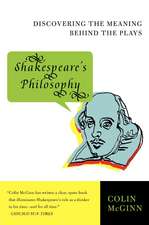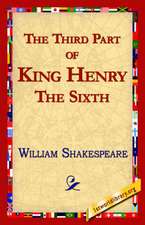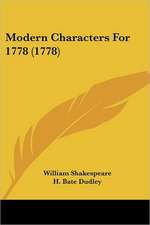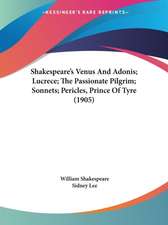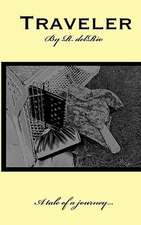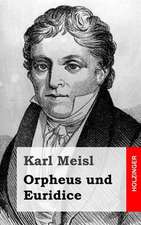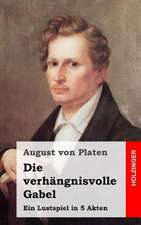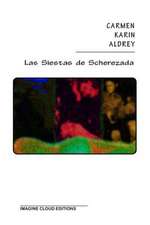Two Gentlemen of Verona
Autor William Shakespeareen Limba Engleză Paperback – 11 sep 2018
Preț: 74.33 lei
Nou
Puncte Express: 111
Preț estimativ în valută:
14.22€ • 14.77$ • 11.86£
14.22€ • 14.77$ • 11.86£
Comandă specială
Livrare economică 25 februarie-03 martie
Preluare comenzi: 021 569.72.76
Specificații
ISBN-13: 9781720254256
ISBN-10: 1720254257
Pagini: 66
Dimensiuni: 152 x 229 x 4 mm
Greutate: 0.11 kg
Editura: LIGHTNING SOURCE INC
ISBN-10: 1720254257
Pagini: 66
Dimensiuni: 152 x 229 x 4 mm
Greutate: 0.11 kg
Editura: LIGHTNING SOURCE INC
Notă biografică
William Shakespeare 26 April 1564 ¿ 23 April 1616was an English poet, playwright and actor, widely regarded as the greatest writer in the English language and the world's greatest dramatist.He is often called England's national poet and the "Bard of Avon".His extant works, including collaborations, consist of approximately 39 plays,154 sonnets, two long narrative poems, and a few other verses, some of uncertain authorship. His plays have been translated into every major living language and are performed more often than those of any other playwright.[
Shakespeare was born and raised in Stratford-upon-Avon, Warwickshire. . Sometime between 1585 and 1592, he began a successful career in London as an actor, writer, and part-owner of a playing company called the Lord Chamberlain's Men, later known as the King's Men. His early plays were primarily comedies and histories and are regarded as some of the best work produced in these genres. Until about 1608, he wrote mainly tragedies, among them Hamlet, Othello, King Lear, and Macbeth, all considered to be among the finest works in the English language. In the last phase of his life, he wrote tragicomedies (also known as romances) and collaborated with other playwrights.
Throughout the 20th and 21st centuries, Shakespeare's works have been continually adapted and rediscovered by new movements in scholarship and performance. His plays remain popular and are studied, performed, and reinterpreted through various cultural and political contexts around the world.
Descriere
Descriere de la o altă ediție sau format:
The Oxford ShakespeareGeneral Editor: Stanley WellsThe Oxford Shakespeare offers authoritative texts from leading scholars in editions designed to interpret and illuminate the plays for modern readers.- A new, modern-spelling text, collated and edited from all existing printings- Wide-ranging introduction explores the lyrical language with which Shakespeare dramatizes competing kinds of love- Detailed performance history designed to meet the needs of theatre professionals- On-page commentary and notes explain language, word-play, and staging- the only edition to provide a setting of the song 'Who is Silvia?' , taken from an Elizabethan source- Illustrated with production photographs and related art- Full index to introduction and commentary- Durable sewn binding for lasting use'not simply a better text but a new conception of Shakespeare' ABOUT THE SERIES: For over 100 years Oxford World's Classics has made available the widest range of literature from around the globe. Each affordable volume reflects Oxford's commitment to scholarship, providing the most accurate text plus a wealth of other valuable features, including expert introductions by leading authorities, helpful notes to clarify the text, up-to-date bibliographies for further study, and much more.
The Oxford ShakespeareGeneral Editor: Stanley WellsThe Oxford Shakespeare offers authoritative texts from leading scholars in editions designed to interpret and illuminate the plays for modern readers.- A new, modern-spelling text, collated and edited from all existing printings- Wide-ranging introduction explores the lyrical language with which Shakespeare dramatizes competing kinds of love- Detailed performance history designed to meet the needs of theatre professionals- On-page commentary and notes explain language, word-play, and staging- the only edition to provide a setting of the song 'Who is Silvia?' , taken from an Elizabethan source- Illustrated with production photographs and related art- Full index to introduction and commentary- Durable sewn binding for lasting use'not simply a better text but a new conception of Shakespeare' ABOUT THE SERIES: For over 100 years Oxford World's Classics has made available the widest range of literature from around the globe. Each affordable volume reflects Oxford's commitment to scholarship, providing the most accurate text plus a wealth of other valuable features, including expert introductions by leading authorities, helpful notes to clarify the text, up-to-date bibliographies for further study, and much more.
Recenzii
“A remarkable edition, one that makes Shakespeare’s extraordinary accomplishment more vivid than ever.”—James Shapiro, professor, Columbia University, bestselling author of A Year in the Life of Shakespeare: 1599
“A feast of literary and historical information.”—The Wall Street Journal
“A feast of literary and historical information.”—The Wall Street Journal
Cuprins
Introduction: date; Themes and criticism; Structure and sources; Speed and Lance; The outlaws; Stage history; Recent stage and critical interpretations by Lucy Munro; List of characters; The play; Textual analysis; Appendix: a further note on stage directions; Reading list.
Extras
Chapter 1
Act 1 Scene 1 running scene 1
Enter Valentine [and] Proteus
VALENTINE Cease to persuade, my loving Proteus:
Home-keeping youth have ever homely wits.
Were't not affection chains thy tender days
To the sweet glances of thy honoured love,
I rather would entreat thy company
To see the wonders of the world abroad,
Than - living dully sluggardized at home -
Wear out thy youth with shapeless idleness.
But since thou lov'st, love still, and thrive therein,
Even as I would, when I to love begin.
PROTEUS Wilt thou be gone? Sweet Valentine, adieu.
Think on thy Proteus, when thou haply see'st
Some rare noteworthy object in thy travel.
Wish me partaker in thy happiness
When thou dost meet good hap: and in thy danger -
If ever danger do environ thee -
Commend thy grievance to my holy prayers,
For I will be thy beadsman, Valentine.
VALENTINE And on a love-book pray for my success?
PROTEUS Upon some book I love, I'll pray for thee.
VALENTINE That's on some shallow story of deep love:
How young Leander crossed the Hellespont.
PROTEUS That's a deep story, of a deeper love,
For he was more than over-shoes in love.
VALENTINE 'Tis true: for you are over-boots in love,
And yet you never swam the Hellespont.
PROTEUS Over the boots? Nay, give me not the boots.
VALENTINE No, I will not, for it boots thee not.
PROTEUS What?
VALENTINE To be in love, where scorn is bought with groans:
Coy looks with heart-sore sighs, one fading moment's mirth,
With twenty watchful, weary, tedious nights;
If haply won, perhaps a hapless gain,
If lost, why then a grievous labour won;
However, but a folly bought with wit,
Or else a wit by folly vanquishèd.
PROTEUS So, by your circumstance, you call me fool.
VALENTINE So, by your circumstance, I fear you'll prove.
PROTEUS 'Tis Love you cavil at: I am not Love.
VALENTINE Love is your master, for he masters you:
And he that is so yokèd by a fool,
Methinks should not be chronicled for wise.
PROTEUS Yet writers say: as in the sweetest bud
The eating canker dwells, so eating love
Inhabits in the finest wits of all.
VALENTINE And writers say: as the most forward bud
Is eaten by the canker ere it blow,
Even so by love, the young and tender wit
Is turned to folly, blasting in the bud,
Losing his verdure, even in the prime,
And all the fair effects of future hopes.
But wherefore waste I time to counsel thee
That art a votary to fond desire?
Once more, adieu. My father at the road
Expects my coming, there to see me shipped.
PROTEUS And thither will I bring thee, Valentine.
VALENTINE Sweet Proteus, no: now let us take our leave.
To Milan let me hear from thee by letters
Of thy success in love, and what news else
Betideth here in absence of thy friend:
And I likewise will visit thee with mine.
PROTEUS All happiness bechance to thee in Milan.
VALENTINE As much to you at home: and so, farewell. Exit
PROTEUS He after honour hunts, I after love;
He leaves his friends to dignify them more;
I leave myself, my friends and all, for love.
Thou, Julia, thou hast metamorphosed me:
Made me neglect my studies, lose my time,
War with good counsel, set the world at nought;
Made wit with musing weak, heart sick with thought.
[Enter Speed]
SPEED Sir Proteus, 'save you. Saw you my master?
PROTEUS But now he parted hence to embark for Milan.
SPEED Twenty to one then, he is shipped already,
And I have played the sheep in losing him.
PROTEUS Indeed, a sheep doth very often stray,
An if the shepherd be awhile away.
SPEED You conclude that my master is a shepherd, then, and I a sheep?
PROTEUS I do.
SPEED Why then, my horns are his horns, whether I wake or sleep.
PROTEUS A silly answer, and fitting well a sheep.
SPEED This proves me still a sheep.
PROTEUS True: and thy master a shepherd.
SPEED Nay, that I can deny by a circumstance.
PROTEUS It shall go hard but I'll prove it by another.
SPEED The shepherd seeks the sheep, and not the sheep the shepherd; but I seek my master, and my master seeks not me. Therefore I am no sheep.
PROTEUS The sheep for fodder follow the shepherd, the shepherd for food follows not the sheep: thou for wages followest thy master, thy master for wages follows not thee. Therefore thou art a sheep.
SPEED Such another proof will make me cry 'baa'.
PROTEUS But dost thou hear? Gav'st thou my letter to Julia?
SPEED Ay, sir: I, a lost-mutton, gave your letter to her, a laced- mutton, and she, a laced-mutton, gave me, a lost-mutton, nothing for my labour.
PROTEUS Here's too small a pasture for such store of muttons.
SPEED If the ground be overcharged, you were best stick her.
PROTEUS Nay, in that you are astray: 'twere best pound you.
SPEED Nay, sir, less than a pound shall serve me for carrying your letter.
PROTEUS You mistake: I mean the pound - a pinfold.
SPEED From a pound to a pin? Fold it over and over, 'tis threefold too little for carrying a letter to your lover. Speed
PROTEUS But what said she? Nods his head
SPEED Ay.
PROTEUS Nod - ay - why, that's 'noddy'.
SPEED You mistook, sir: I say she did nod, and you ask me if she did nod, and I say 'ay'.
PROTEUS And that set together is noddy.
SPEED Now you have taken the pains to set it together, take it for your pains.
PROTEUS No, no, you shall have it for bearing the letter.
SPEED Well, I perceive I must be fain to bear with you.
PROTEUS Why sir, how do you bear with me?
SPEED Marry, sir, the letter, very orderly, having nothing but the word 'noddy' for my pains.
PROTEUS Beshrew me, but you have a quick wit.
SPEED And yet it cannot overtake your slow purse.
PROTEUS Come come, open the matter in brief: what said she?
SPEED Open your purse, that the money and the matter may be both at once delivered.
PROTEUS Well, sir: here is for your pains. What said she? Gives a coin
SPEED Truly, sir, I think you'll hardly win her. Examines coin, with contempt
PROTEUS Why? Couldst thou perceive so much from her?
SPEED Sir, I could perceive nothing at all from her; no, not so much as a ducat for delivering your letter. And being so hard to me that brought your mind, I fear she'll prove as hard to you in telling your mind. Give her no token but stones, for she's as hard as steel.
PROTEUS What said she, nothing?
SPEED No, not so much as 'Take this for thy pains.' To testify your bounty, I thank you, you have testerned me; in requital whereof, henceforth carry your letters yourself. And so, sir, I'll commend you to my master.
PROTEUS Go, go, begone, to save your ship from wreck, [Exit Speed]
Which cannot perish having thee aboard,
Being destined to a drier death on shore.
I must go send some better messenger:
I fear my Julia would not deign my lines,
Receiving them from such a worthless post. Exit
Act 1 Scene 2 running scene 2
Enter Julia and Lucetta
JULIA But say, Lucetta - now we are alone -
Wouldst thou then counsel me to fall in love?
LUCETTA Ay, madam, so you stumble not unheedfully.
JULIA Of all the fair resort of gentlemen
That every day with parle encounter me,
In thy opinion, which is worthiest love?
LUCETTA Please you repeat their names, I'll show my mind,
According to my shallow simple skill.
JULIA What think'st thou of the fair Sir Eglamour?
LUCETTA As of a knight well-spoken, neat and fine;
But, were I you, he never should be mine.
JULIA What think'st thou of the rich Mercatio?
LUCETTA Well of his wealth; but of himself, so so.
JULIA What think'st thou of the gentle Proteus?
LUCETTA Lord, Lord: to see what folly reigns in us!
JULIA How now? What means this passion at his name?
LUCETTA Pardon, dear madam: 'tis a passing shame
That I - unworthy body as I am -
Should censure thus on lovely gentlemen.
JULIA Why not on Proteus, as of all the rest?
LUCETTA Then thus: of many good, I think him best.
JULIA Your reason?
LUCETTA I have no other, but a woman's reason:
I think him so because I think him so.
JULIA And wouldst thou have me cast my love on him?
LUCETTA Ay, if you thought your love not cast away.
JULIA Why he, of all the rest, hath never moved me.
LUCETTA Yet he, of all the rest, I think best loves ye.
JULIA His little speaking shows his love but small.
LUCETTA Fire that's closest kept burns most of all.
JULIA They do not love that do not show their love.
LUCETTA O, they love least that let men know their love.
JULIA I would I knew his mind.
LUCETTA Peruse this paper, madam. Gives a letter
JULIA 'To Julia'. Say, from whom?
LUCETTA That the contents will show.
JULIA Say, say: who gave it thee?
LUCETTA Sir Valentine's page: and sent, I think, from Proteus.
He would have given it you, but I, being in the way,
Did in your name receive it: pardon the fault, I pray.
JULIA Now, by my modesty, a goodly broker!
Dare you presume to harbour wanton lines?
To whisper and conspire against my youth?
Now trust me, 'tis an office of great worth,
And you an officer fit for the place.
There, take the paper: see it be returned,
Or else return no more into my sight.
LUCETTA To plead for love deserves more fee than hate.
JULIA Will ye be gone?
LUCETTA That you may ruminate. Exit
JULIA And yet I would I had o'erlooked the letter;
It were a shame to call her back again
And pray her to a fault for which I chid her.
What fool is she, that knows I am a maid,
And would not force the letter to my view!
Since maids, in modesty, say 'no' to that
Which they would have the profferer construe 'ay'.
Fie, fie: how wayward is this foolish love
That - like a testy babe - will scratch the nurse
And presently, all humbled, kiss the rod!
How churlishly I chid Lucetta hence,
When willingly I would have had her here!
How angerly I taught my brow to frown,
When inward joy enforced my heart to smile!
My penance is to call Lucetta back
And ask remission for my folly past.
What ho! Lucetta!
[Enter Lucetta]
LUCETTA What would your ladyship?
JULIA Is't near dinner-time?
LUCETTA I would it were,
That you might kill your stomach on your meat
And not upon your maid. Drops a letter,
JULIA What is't that you took up so gingerly? then picks it up
LUCETTA Nothing.
JULIA Why didst thou stoop then?
LUCETTA To take a paper up that I let fall.
JULIA And is that paper nothing?
LUCETTA Nothing concerning me.
JULIA Then let it lie for those that it concerns.
LUCETTA Madam, it will not lie where it concerns,
Unless it have a false interpreter.
JULIA Some love of yours hath writ to you in rhyme.
LUCETTA That I might sing it, madam, to a tune.
Give me a note: your ladyship can set-
JULIA As little by such toys as may be possible.
Best sing it to the tune of 'Light o'love'.
LUCETTA It is too heavy for so light a tune.
JULIA Heavy? Belike it hath some burden then?
LUCETTA Ay, and melodious were it, would you sing it.
JULIA And why not you?
LUCETTA I cannot reach so high.
JULIA Let's see your song. Takes the letter
How now, minion!
LUCETTA Keep tune there still, so you will sing it out:
And yet methinks I do not like this tune.
JULIA You do not?
LUCETTA No, madam, 'tis too sharp.
JULIA You, minion, are too saucy.
LUCETTA Nay, now you are too flat,
And mar the concord with too harsh a descant:
There wanteth but a mean to fill your song.
JULIA The mean is drowned with your unruly bass.
LUCETTA Indeed, I bid the base for Proteus.
JULIA This babble shall not henceforth trouble me.
Here is a coil with protestation! Tears the letter
Go, get you gone, and let the papers lie:
You would be fing'ring them to anger me.
LUCETTA She makes it strange, but she would be best pleased
To be so angered with another letter. [Exit]
JULIA Nay, would I were so angered with the same:
O hateful hands, to tear such loving words;
Injurious wasps, to feed on such sweet honey
And kill the bees that yield it with your stings!
I'll kiss each several paper for amends.
Look, here is writ 'kind Julia'. Unkind Julia, ØExamining the piecesØ
As in revenge of thy ingratitude,
I throw thy name against the bruising stones,
Trampling contemptuously on thy disdain.
And here is writ 'love-wounded Proteus'.
Poor wounded name: my bosom as a bed
Shall lodge thee till thy wound be throughly healed;
And thus I search it with a sovereign kiss.
But twice or thrice was 'Proteus' written down.
Be calm, good wind, blow not a word away
Till I have found each letter, in the letter,
Except mine own name: that, some whirlwind bear
Unto a ragged, fearful, hanging rock,
And throw it thence into the raging sea.
Lo, here in one line is his name twice writ:
'Poor forlorn Proteus, passionate Proteus,
To the sweet Julia': that I'll tear away:
And yet I will not, sith so prettily
He couples it to his complaining names.
Thus will I fold them, one upon another;
Now kiss, embrace, contend, do what you will.
[Enter Lucetta]
LUCETTA Madam, dinner is ready, and your father stays.
JULIA Well, let us go.
LUCETTA What, shall these papers lie like tell-tales here?
JULIA If you respect them, best to take them up.
LUCETTA Nay, I was taken up for laying them down.
Yet here they shall not lie, for catching cold. Picks up the pieces
JULIA I see you have a month's mind to them.
LUCETTA Ay, madam, you may say what sights you see;
I see things too, although you judge I wink.
JULIA Come, come: will't please you go? Exeunt
Act 1 Scene 3 running scene 3
Enter Antonio and Pantino
ANTONIO Tell me, Pantino, what sad talk was that
Wherewith my brother held you in the cloister?
PANTINO 'Twas of his nephew Proteus, your son.
ANTONIO Why? What of him?
PANTINO He wondered that your lordship
Would suffer him to spend his youth at home,
While other men, of slender reputation,
Put forth their sons to seek preferment out:
Some to the wars to try their fortune there,
Some to discover islands far away,
Some to the studious universities;
For any or for all these exercises,
He said that Proteus your son was meet,
And did request me to importune you
To let him spend his time no more at home,
Which would be great impeachment to his age,
In having known no travel in his youth.
Act 1 Scene 1 running scene 1
Enter Valentine [and] Proteus
VALENTINE Cease to persuade, my loving Proteus:
Home-keeping youth have ever homely wits.
Were't not affection chains thy tender days
To the sweet glances of thy honoured love,
I rather would entreat thy company
To see the wonders of the world abroad,
Than - living dully sluggardized at home -
Wear out thy youth with shapeless idleness.
But since thou lov'st, love still, and thrive therein,
Even as I would, when I to love begin.
PROTEUS Wilt thou be gone? Sweet Valentine, adieu.
Think on thy Proteus, when thou haply see'st
Some rare noteworthy object in thy travel.
Wish me partaker in thy happiness
When thou dost meet good hap: and in thy danger -
If ever danger do environ thee -
Commend thy grievance to my holy prayers,
For I will be thy beadsman, Valentine.
VALENTINE And on a love-book pray for my success?
PROTEUS Upon some book I love, I'll pray for thee.
VALENTINE That's on some shallow story of deep love:
How young Leander crossed the Hellespont.
PROTEUS That's a deep story, of a deeper love,
For he was more than over-shoes in love.
VALENTINE 'Tis true: for you are over-boots in love,
And yet you never swam the Hellespont.
PROTEUS Over the boots? Nay, give me not the boots.
VALENTINE No, I will not, for it boots thee not.
PROTEUS What?
VALENTINE To be in love, where scorn is bought with groans:
Coy looks with heart-sore sighs, one fading moment's mirth,
With twenty watchful, weary, tedious nights;
If haply won, perhaps a hapless gain,
If lost, why then a grievous labour won;
However, but a folly bought with wit,
Or else a wit by folly vanquishèd.
PROTEUS So, by your circumstance, you call me fool.
VALENTINE So, by your circumstance, I fear you'll prove.
PROTEUS 'Tis Love you cavil at: I am not Love.
VALENTINE Love is your master, for he masters you:
And he that is so yokèd by a fool,
Methinks should not be chronicled for wise.
PROTEUS Yet writers say: as in the sweetest bud
The eating canker dwells, so eating love
Inhabits in the finest wits of all.
VALENTINE And writers say: as the most forward bud
Is eaten by the canker ere it blow,
Even so by love, the young and tender wit
Is turned to folly, blasting in the bud,
Losing his verdure, even in the prime,
And all the fair effects of future hopes.
But wherefore waste I time to counsel thee
That art a votary to fond desire?
Once more, adieu. My father at the road
Expects my coming, there to see me shipped.
PROTEUS And thither will I bring thee, Valentine.
VALENTINE Sweet Proteus, no: now let us take our leave.
To Milan let me hear from thee by letters
Of thy success in love, and what news else
Betideth here in absence of thy friend:
And I likewise will visit thee with mine.
PROTEUS All happiness bechance to thee in Milan.
VALENTINE As much to you at home: and so, farewell. Exit
PROTEUS He after honour hunts, I after love;
He leaves his friends to dignify them more;
I leave myself, my friends and all, for love.
Thou, Julia, thou hast metamorphosed me:
Made me neglect my studies, lose my time,
War with good counsel, set the world at nought;
Made wit with musing weak, heart sick with thought.
[Enter Speed]
SPEED Sir Proteus, 'save you. Saw you my master?
PROTEUS But now he parted hence to embark for Milan.
SPEED Twenty to one then, he is shipped already,
And I have played the sheep in losing him.
PROTEUS Indeed, a sheep doth very often stray,
An if the shepherd be awhile away.
SPEED You conclude that my master is a shepherd, then, and I a sheep?
PROTEUS I do.
SPEED Why then, my horns are his horns, whether I wake or sleep.
PROTEUS A silly answer, and fitting well a sheep.
SPEED This proves me still a sheep.
PROTEUS True: and thy master a shepherd.
SPEED Nay, that I can deny by a circumstance.
PROTEUS It shall go hard but I'll prove it by another.
SPEED The shepherd seeks the sheep, and not the sheep the shepherd; but I seek my master, and my master seeks not me. Therefore I am no sheep.
PROTEUS The sheep for fodder follow the shepherd, the shepherd for food follows not the sheep: thou for wages followest thy master, thy master for wages follows not thee. Therefore thou art a sheep.
SPEED Such another proof will make me cry 'baa'.
PROTEUS But dost thou hear? Gav'st thou my letter to Julia?
SPEED Ay, sir: I, a lost-mutton, gave your letter to her, a laced- mutton, and she, a laced-mutton, gave me, a lost-mutton, nothing for my labour.
PROTEUS Here's too small a pasture for such store of muttons.
SPEED If the ground be overcharged, you were best stick her.
PROTEUS Nay, in that you are astray: 'twere best pound you.
SPEED Nay, sir, less than a pound shall serve me for carrying your letter.
PROTEUS You mistake: I mean the pound - a pinfold.
SPEED From a pound to a pin? Fold it over and over, 'tis threefold too little for carrying a letter to your lover. Speed
PROTEUS But what said she? Nods his head
SPEED Ay.
PROTEUS Nod - ay - why, that's 'noddy'.
SPEED You mistook, sir: I say she did nod, and you ask me if she did nod, and I say 'ay'.
PROTEUS And that set together is noddy.
SPEED Now you have taken the pains to set it together, take it for your pains.
PROTEUS No, no, you shall have it for bearing the letter.
SPEED Well, I perceive I must be fain to bear with you.
PROTEUS Why sir, how do you bear with me?
SPEED Marry, sir, the letter, very orderly, having nothing but the word 'noddy' for my pains.
PROTEUS Beshrew me, but you have a quick wit.
SPEED And yet it cannot overtake your slow purse.
PROTEUS Come come, open the matter in brief: what said she?
SPEED Open your purse, that the money and the matter may be both at once delivered.
PROTEUS Well, sir: here is for your pains. What said she? Gives a coin
SPEED Truly, sir, I think you'll hardly win her. Examines coin, with contempt
PROTEUS Why? Couldst thou perceive so much from her?
SPEED Sir, I could perceive nothing at all from her; no, not so much as a ducat for delivering your letter. And being so hard to me that brought your mind, I fear she'll prove as hard to you in telling your mind. Give her no token but stones, for she's as hard as steel.
PROTEUS What said she, nothing?
SPEED No, not so much as 'Take this for thy pains.' To testify your bounty, I thank you, you have testerned me; in requital whereof, henceforth carry your letters yourself. And so, sir, I'll commend you to my master.
PROTEUS Go, go, begone, to save your ship from wreck, [Exit Speed]
Which cannot perish having thee aboard,
Being destined to a drier death on shore.
I must go send some better messenger:
I fear my Julia would not deign my lines,
Receiving them from such a worthless post. Exit
Act 1 Scene 2 running scene 2
Enter Julia and Lucetta
JULIA But say, Lucetta - now we are alone -
Wouldst thou then counsel me to fall in love?
LUCETTA Ay, madam, so you stumble not unheedfully.
JULIA Of all the fair resort of gentlemen
That every day with parle encounter me,
In thy opinion, which is worthiest love?
LUCETTA Please you repeat their names, I'll show my mind,
According to my shallow simple skill.
JULIA What think'st thou of the fair Sir Eglamour?
LUCETTA As of a knight well-spoken, neat and fine;
But, were I you, he never should be mine.
JULIA What think'st thou of the rich Mercatio?
LUCETTA Well of his wealth; but of himself, so so.
JULIA What think'st thou of the gentle Proteus?
LUCETTA Lord, Lord: to see what folly reigns in us!
JULIA How now? What means this passion at his name?
LUCETTA Pardon, dear madam: 'tis a passing shame
That I - unworthy body as I am -
Should censure thus on lovely gentlemen.
JULIA Why not on Proteus, as of all the rest?
LUCETTA Then thus: of many good, I think him best.
JULIA Your reason?
LUCETTA I have no other, but a woman's reason:
I think him so because I think him so.
JULIA And wouldst thou have me cast my love on him?
LUCETTA Ay, if you thought your love not cast away.
JULIA Why he, of all the rest, hath never moved me.
LUCETTA Yet he, of all the rest, I think best loves ye.
JULIA His little speaking shows his love but small.
LUCETTA Fire that's closest kept burns most of all.
JULIA They do not love that do not show their love.
LUCETTA O, they love least that let men know their love.
JULIA I would I knew his mind.
LUCETTA Peruse this paper, madam. Gives a letter
JULIA 'To Julia'. Say, from whom?
LUCETTA That the contents will show.
JULIA Say, say: who gave it thee?
LUCETTA Sir Valentine's page: and sent, I think, from Proteus.
He would have given it you, but I, being in the way,
Did in your name receive it: pardon the fault, I pray.
JULIA Now, by my modesty, a goodly broker!
Dare you presume to harbour wanton lines?
To whisper and conspire against my youth?
Now trust me, 'tis an office of great worth,
And you an officer fit for the place.
There, take the paper: see it be returned,
Or else return no more into my sight.
LUCETTA To plead for love deserves more fee than hate.
JULIA Will ye be gone?
LUCETTA That you may ruminate. Exit
JULIA And yet I would I had o'erlooked the letter;
It were a shame to call her back again
And pray her to a fault for which I chid her.
What fool is she, that knows I am a maid,
And would not force the letter to my view!
Since maids, in modesty, say 'no' to that
Which they would have the profferer construe 'ay'.
Fie, fie: how wayward is this foolish love
That - like a testy babe - will scratch the nurse
And presently, all humbled, kiss the rod!
How churlishly I chid Lucetta hence,
When willingly I would have had her here!
How angerly I taught my brow to frown,
When inward joy enforced my heart to smile!
My penance is to call Lucetta back
And ask remission for my folly past.
What ho! Lucetta!
[Enter Lucetta]
LUCETTA What would your ladyship?
JULIA Is't near dinner-time?
LUCETTA I would it were,
That you might kill your stomach on your meat
And not upon your maid. Drops a letter,
JULIA What is't that you took up so gingerly? then picks it up
LUCETTA Nothing.
JULIA Why didst thou stoop then?
LUCETTA To take a paper up that I let fall.
JULIA And is that paper nothing?
LUCETTA Nothing concerning me.
JULIA Then let it lie for those that it concerns.
LUCETTA Madam, it will not lie where it concerns,
Unless it have a false interpreter.
JULIA Some love of yours hath writ to you in rhyme.
LUCETTA That I might sing it, madam, to a tune.
Give me a note: your ladyship can set-
JULIA As little by such toys as may be possible.
Best sing it to the tune of 'Light o'love'.
LUCETTA It is too heavy for so light a tune.
JULIA Heavy? Belike it hath some burden then?
LUCETTA Ay, and melodious were it, would you sing it.
JULIA And why not you?
LUCETTA I cannot reach so high.
JULIA Let's see your song. Takes the letter
How now, minion!
LUCETTA Keep tune there still, so you will sing it out:
And yet methinks I do not like this tune.
JULIA You do not?
LUCETTA No, madam, 'tis too sharp.
JULIA You, minion, are too saucy.
LUCETTA Nay, now you are too flat,
And mar the concord with too harsh a descant:
There wanteth but a mean to fill your song.
JULIA The mean is drowned with your unruly bass.
LUCETTA Indeed, I bid the base for Proteus.
JULIA This babble shall not henceforth trouble me.
Here is a coil with protestation! Tears the letter
Go, get you gone, and let the papers lie:
You would be fing'ring them to anger me.
LUCETTA She makes it strange, but she would be best pleased
To be so angered with another letter. [Exit]
JULIA Nay, would I were so angered with the same:
O hateful hands, to tear such loving words;
Injurious wasps, to feed on such sweet honey
And kill the bees that yield it with your stings!
I'll kiss each several paper for amends.
Look, here is writ 'kind Julia'. Unkind Julia, ØExamining the piecesØ
As in revenge of thy ingratitude,
I throw thy name against the bruising stones,
Trampling contemptuously on thy disdain.
And here is writ 'love-wounded Proteus'.
Poor wounded name: my bosom as a bed
Shall lodge thee till thy wound be throughly healed;
And thus I search it with a sovereign kiss.
But twice or thrice was 'Proteus' written down.
Be calm, good wind, blow not a word away
Till I have found each letter, in the letter,
Except mine own name: that, some whirlwind bear
Unto a ragged, fearful, hanging rock,
And throw it thence into the raging sea.
Lo, here in one line is his name twice writ:
'Poor forlorn Proteus, passionate Proteus,
To the sweet Julia': that I'll tear away:
And yet I will not, sith so prettily
He couples it to his complaining names.
Thus will I fold them, one upon another;
Now kiss, embrace, contend, do what you will.
[Enter Lucetta]
LUCETTA Madam, dinner is ready, and your father stays.
JULIA Well, let us go.
LUCETTA What, shall these papers lie like tell-tales here?
JULIA If you respect them, best to take them up.
LUCETTA Nay, I was taken up for laying them down.
Yet here they shall not lie, for catching cold. Picks up the pieces
JULIA I see you have a month's mind to them.
LUCETTA Ay, madam, you may say what sights you see;
I see things too, although you judge I wink.
JULIA Come, come: will't please you go? Exeunt
Act 1 Scene 3 running scene 3
Enter Antonio and Pantino
ANTONIO Tell me, Pantino, what sad talk was that
Wherewith my brother held you in the cloister?
PANTINO 'Twas of his nephew Proteus, your son.
ANTONIO Why? What of him?
PANTINO He wondered that your lordship
Would suffer him to spend his youth at home,
While other men, of slender reputation,
Put forth their sons to seek preferment out:
Some to the wars to try their fortune there,
Some to discover islands far away,
Some to the studious universities;
For any or for all these exercises,
He said that Proteus your son was meet,
And did request me to importune you
To let him spend his time no more at home,
Which would be great impeachment to his age,
In having known no travel in his youth.

